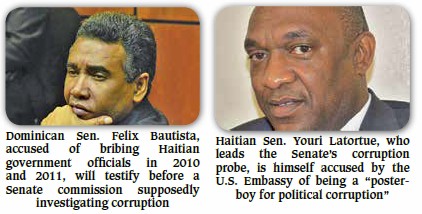|
 On
Jul. 25, Dominican Sen. Felix Bautista will testify
before the Haitian Senate’s Ethics and Anti-corruption
Commission in the context of its investigation of the
management of Haiti’s Petrocaribe program. The
Commission’s controversial President, Sen. Youri
Latortue, of the Artibonite, a former advisor to former
President Michel Martelly, announced the hearing on Jul.
18.
"We wrote different people, including Sen.
Bautista, who is the CEO of the Dominican [construction]
firms Hadom and ROFI,” Latortue said. “We received a
response from Bautista, who requested a postponement of
eight days. He replied and assured us that he will
come."
Dominican firms and construction companies have
received contracts for many projects financed by the
Petrocaribe fund, which is a multi-billion-dollar,
low-interest, long-term loan account made possible by
the sale of Venezuelan oil products. The Senate
Commission is investigating why and how many contracts
signed with Dominican companies were breached or
canceled by the Haitian government because the projects
were abandoned or the companies were unable to complete
the projects.
"The Bautista hearing will be extremely important
for the Commission,” Sen. Latortue said. “That's why we
just signed another letter that we will send to Bautista
via the Dominican Embassy in Haiti, to answer questions
from senators on the Commission on Mon., Jul. 25 at
noon."
In a Mar. 31, 2012 television exposé, Dominican
investigative journalist Nuria Piera
revealed secret spreadsheets
showing that Sen. Bautista had paid some $2.6 million in
more than a dozen payments to Michel Martelly as a
Haitian candidate, president-elect, and president.
Piera’s documents also show that Bautista gave a
$250,000 cash payment in February 2011 to Mirlande
Manigat, Martelly’s opponent in the Mar. 20, 2011
presidential run-off.
Sen. Youri Latortue was the head of Manigat’s
campaign at the time and claimed to know nothing about
the payment, saying Piera’s report was “wrong.”
Sen. Latortue said he recently visited the
Dominican Republic during which time he and other
Commission members met with Nuria Piera to discuss her
investigations, for which she was sued by Bautista. In
2015, Bautista was yet again indicted for corruption. In
October 2015, Nuria Piera announced that
Washington had cancelled
Bautista’s U.S. visa.
For several months, the Haitian Senate has been
investigating accusations of misappropriations from the
Petrocaribe Fund, subpoenaing ministers, prime
ministers, and CEOs to appear before it.
However, many have questioned if, in fact, the
Senate Commission, and Sen. Youri Latortue in
particular, are covering up, rather than uncovering,
corruption. On Apr. 14, 2016, seven leading Haitian
popular, student, and worker organizations addressed an
open letter to Latortue, questioning if he was fit to be
heading a Senate Ethics and Anti-corruption Commission
because of 1) doubts about the validity of his 2015
re-election and 2)
charges leveled by the U.S.
Embassy itself about Youri Latortue being a
“poster-boy for political corruption.”
“If you have a clear conscience and you are not a
drug-dealer, a completely corrupt politician, a Mafia
boss, and an assassin as reported in the newspaper [Haïti
Liberté], you must immediately take all formal
measures to rapidly address these grave accusations
which hang over you today,” the open letter said. “While
these big charges hang over you, you have the audacity
to self-proclaim yourself President of an Ethics and
Anti-corruption Commission. So, Mr. Contested Senator,
you take everyone in the population for imbeciles. Don’t
you remember you were in the National Palace during the
whole Martelly [Tèt Kale] regime giving that clique
advice on how to embezzle the money of Petrocaribe and
other accounts?”
The Petrocaribe fund was established,
despite fierce U.S. sabotage,
by the governments of Presidents René Préval and Hugo
Chavez between 2007 and 2009. Under the Petrocaribe
accord, Venezuela provides Haiti with all the oil it
needs, while Haiti pays only 60% up front, the remaining
40% going into the Petrocaribe fund, which is to be paid
over 25 years at 1% interest. The fund was aimed at
providing capital for Haiti to invest in development
projects to “aid the Haitian people.”
During his five years in office from 2011 to
2016, Pres. Martelly, his cronies, and his family are
believed to have looted some $2 billion from the
Petrocaribe account through bogus development projects
which did not in fact help Haitians. In 2013,
Martelly admitted that Venezuela provided
94% of Haiti’s total investment
funds.
In March 2016, interim Haitian President Jocelerme
Privert said that the Martelly government stopped paying
Venezuela in August 2015 for the oil it was delivering.
Haiti is now almost one year in arrears in its oil
payments to cash-strapped Venezuela.
|